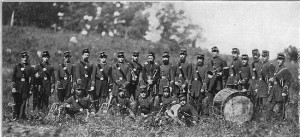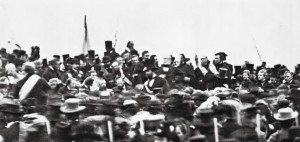
Collegium sings songs of the Civil War
When the Civil War came to the United States, it came to a people who, musically speaking, were a churchy lot.
But they were also a people of sentimental secular song that hymned home and hearth, of minstrelsy and spiritual, and to hear the music of this time is to gain a greater understanding of the character of the country that had split itself in two and embarked on a bloody and bitter path of internecine conflict.
To commemorate one of the high points of the war, the 150th anniversary of the signing of the Emancipation Proclamation, the Collegium Musicum at the University of Miami presents two concerts of choral music from the era. The 17-member ensemble will be led by its founder, Donald Oglesby, UM’s associate director of choral studies and the director of its bachelor’s degree program in music.
Oglesby said the idea for the concert came from his side research during work on the American Choral Music Project, an endeavor of the American Choral Directors Association and the Library of Congress. Last summer, while in Washington for a symposium on American choral music, Oglesby visited some of the iconic Civil War sites within the Washington area, such as the Antietam battlefield in western Maryland, and the armory at Harpers Ferry, W. Va., where John Brown launched his abortive abolitionist rebellion in 1859.
“You look back to the 19th century, and there’s a huge amount of material that nobody knows,” Oglesby said.
The program will consist of 26 songs, including three by the country’s most important 19th-century songwriter, Stephen Foster, The Collegium will perform little-known songs such as That’s What’s the Matter, Willie’s Gone to the War, and Better Times are Comin’.
“He was the first musical rock star in America’s history,” Oglesby said. “So many of his pieces became wildly popular … Everybody had copies in their piano bench.”
The concert will open with The Star-Spangled Banner (an older, slightly different version than we know it today) and John Brown’s Body, set to the tune of The Battle Hymn of the Republic. Those two scene-setting songs will be followed by two black spirituals, the Harry Burleigh setting of Go Down, Moses, and then Steal Away, “both of those having some implications for double meanings,” Oglesby said, referring to the Underground Railroad.
A section of battlefield songs follows, including Tenting on the Old Campground, and Just Before the Battle, Mother, a song by George S. Root that everyone at the time knew. It will be accompanied by the reading of an excerpt from a soldier’s letter from the period written by one of the Collegium singers’ ancestors. Also on the half will be We Are Coming, Father Abraham, a song set to a James S. Gibbon poem published in a Washington newspaper after President Abraham Lincoln issued a recruiting call for 300,000 more troops to serve the Union cause.
There also will be a selection of Confederate patriotic songs, including Dixie, The Bonnie Blue Flag, and God Save the South. Oglesby said during a trip to the Gettysburg battlefield in Pennsylvania, he was able to see a manuscript copy of the song as set down by its composer, Daniel Emmett.
The second half kicks off with a re-texted version of the Anvil Chorus from Verdi’s 1853 opera Il Trovatore, a performance of which Lincoln and his wife attended, and the hymn Gently Lord, O Gently Lead Us, following the recounting of a moment during the Battle of Gettysburg in which a wounded Confederate soldier in the middle of the lines sang a hymn as he lay there, briefly bringing a halt to the fighting.
“I think that’s going to be quite haunting for everybody,” he said. Next will come Oglesby’s arrangement of O Jesus, My Savior. “These two hymns are representative of the best of the hymns of the period. They’re wonderful-quality,” he said.
The Gettysburg dedication, Nov. 19, 1863. President Abraham Lincoln can be seen at the center, hatless, just to the left of a man wearing a top hat. Photo by Matthew Brady
One important find is the two pieces of music that were composed specifically for the consecration of the Gettysburg battlefield cemetery in November 1863. It was a solemn ceremony for the time, but would have been forgotten save for Lincoln’s brief but masterful address there, with its ringing salutation to government “of the people, by the people, and for the people.”
It’s likely that these two occasional pieces are now being heard again for the first time since that performance. One of them is Consecration Chant, by a composer named Wilson G. Horner, a five-verse composition that Oglesby said is similar to Anglican chant, with static chords and long lines of text. After the speeches came a dirge (this was a cemetery dedication, after all) by another little-known composer, Alfred Delaney.
“It’s kind of amazing to think that speech has become one of the most famous in history,” he said.
Other works on the program include then-popular songs such Tramp, Tramp, Tramp, a war song by Root that is still familiar to today’s listeners as Jesus Loves the Little Children. He’ll also make a nod to the waves of Irish immigration at the time with When Johnny Comes Marching Home paired with Johnny, I Hardly Knew Ye.
The concert will end with a work called The New Emancipation Song, followed by The Battle Hymn of the Republic.
For Oglesby, 65, a native of Birmingham, Ala., the intellectual disconnect between a people who were fundamentally “deeply religious” but who also lived in a society that tolerated slavery was central to the war.
“You see that conflict everywhere at this time,” he said. “They were people with honest, different perspectives and opinions who could not find a way to listen to the other side.”
Oglesby is already making plans for the next big Civil War commemoration two years from now, when the country marks the 150th anniversary of the war’s end, and of the assassination of Lincoln (one of the most far-reaching tragedies in American history). It’s worth noting that Lincoln, who loved the theater, was particularly fond of Dixie, and a day after Appomattox he told a crowd that had serenaded him at the White House that he wanted the band with them to play it.
“I have always thought ‘Dixie’ one of the best tunes I have ever heard,” Lincoln said. “Our adversaries over the way attempted to appropriate it, but I insisted yesterday we fairly captured it. I presented the question to the attorney general, and he gave it as his legal opinion that it is our lawful prize. I now request the band to favor me with its performance.”
Five days later he was dead, but the musical milieu in which he lived is still with us, and some of the flavor of his times can be heard with it in these two concerts by the Collegium.
Collegium Musicum will perform this program at 8 p.m. Saturday at Riviera Presbyterian Church, 5275 Sunset Dr., Miami, and at 3 p.m. Sunday at First United Methodist Church, 400 Biscayne Blvd., Miami. Tickets will be available at the door for $10; $5 for students. For information, call the University of Miami at 305-284-4162.
Recent Content
-
Artsarticle ·
-
Artsarticle ·
-
Artsarticle ·

